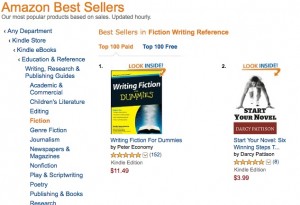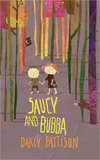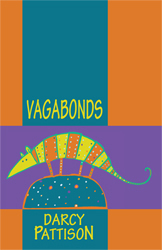- How many pages are in a typical children’s picture book?
- Who is the audience of a children’s picture book? Hint: It's not just kids.
- Are there restrictions on the vocabulary you use in a picture book?
- Do I have to write in rhyme? Do manuscripts written in rhyme sell better?
- Do EPUB books have to the same length as printed books?
Everyone wants to know the secret ingredients to sell books. What should you put in your cover letter, your blurb, your flap copy, or your book jacket? Whether you are selling to an editor, an agent or a reader, what will earn your book a second look?
No one knows for sure. But BookBub’s Unbound has some intriguing facts that hint at the answers.
BookBub describes itself this way:
BookBub is the leading service for publishers and authors looking to reach new readers through limited-time eBook deals. Our 2 million+ subscribers turn to BookBub’s daily email to find free and deeply discounted eBooks that match their interests.
In other words, an author agrees to lower the price of an ebook for a certain time period; during that time, BookBub sends out an email about your book (along with promos on other books, as well). It means that BookBub has an incredible data source that can tell them when a promo is clicked on and when it converts to a sale.
BookBub.com suggests five things are helpful in book marketing:
- Reviews. Listing the number of Amazon or GoodReads reviews can result in 20-30% better results. This is one type of “social proof,” which means that when other people do something, you’re more likely to go along. We use social proofs all the time. When you see the widget on my site that says I have 1164 Followers on Pinterest, you’re more likely to check me out and follow me there. That’s social proof. On your site, you could add info on the number of Amazon or GoodReads reviews you get to encourage readers to click through and check it out. Or consider other means of social proofs that could help–and use all you can. Cite stats from your previous book in cover letters; use for book descriptions.
- Best-sellers and Awards. Yes, these matter. Any recognition that pulls you out of the crowd will help. However, some awards get more respect–and therefore, get more sales results. Bookbub says a “New York Times BestSeller” wins over a “bestselling author.” Recently, one of my how-to-write books, Start Your Novel, climbed to the top of its category on Amazon/Kindle, making it an “Amazon BestSeller.”
 That’s good! It’s not as good as a “New York Times Bestseller,” but it’s better than no awards; it pulls the book out of obscurity. Use for book covers, author bio, book descriptions and cover letters.
That’s good! It’s not as good as a “New York Times Bestseller,” but it’s better than no awards; it pulls the book out of obscurity. Use for book covers, author bio, book descriptions and cover letters.  Character Names. My forthcoming novel, SAUCY AND BUBBA: A HANSEL AND GRETEL TALE, puts the character’s names in the title itself. If you can’t manage that, use names in the blurb itself. NOT: a brother and sister. INSTEAD: Saucy and Bubba. Use in cover letter, flap copy, and book description.
Character Names. My forthcoming novel, SAUCY AND BUBBA: A HANSEL AND GRETEL TALE, puts the character’s names in the title itself. If you can’t manage that, use names in the blurb itself. NOT: a brother and sister. INSTEAD: Saucy and Bubba. Use in cover letter, flap copy, and book description.- Hilarious. According to BookBub, it only happened to one novel. But the single additional word, “Hilarious,” gave one book promo 4000 more clicks (we don’t know percentages, but 4000 clicks is significant!). Will it help your story? Not if hilarious doesn’t properly describe your novel. Instead, BookBub suggests you find other descriptive language that will intrigue the reader: heart-warming, intriguing, a night to remember, etc. Work hard to use the strongest language possible. Use in cover letters, flap copy, book description and covers.
 Comparison Title. No. Do not compare your book to Harry Potter. But DO describe your book in comparison to other stories. For example, for one forthcoming novel, VAGABONDS, I am using this comparison: In the tradition of Charlotte’s Web or The Underneath, this American fantasy . . .” This lists two well-known American fantasies, stories that take place in America and draw upon the American landscape. It’s a positioning statement, or a way to tell readers in shorthand what they can expect. Use in cover letters, book descriptions and flap copy.
Comparison Title. No. Do not compare your book to Harry Potter. But DO describe your book in comparison to other stories. For example, for one forthcoming novel, VAGABONDS, I am using this comparison: In the tradition of Charlotte’s Web or The Underneath, this American fantasy . . .” This lists two well-known American fantasies, stories that take place in America and draw upon the American landscape. It’s a positioning statement, or a way to tell readers in shorthand what they can expect. Use in cover letters, book descriptions and flap copy.
Read the BookBub article for more on exactly how much each of these strategies can improve your results.





Hi Renee,
fabulous list of what's what in the publishing game.
This is a very practical list of publishing terms which I'll recommend to my writing students.
Many 'shy' people find the 'pitch' the most difficult.
Thanks Hazel and Karen for your comments. I'll keep adding to this list as I'm sure there's many more.